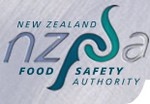NZFSA certification standard goes global
More countries will use a paperless system to clear goods at the border now the United Nations has released an international electronic certification standard built on work by the New Zealand Food Safety Authority (NZFSA) and the Australian Quarantine and Inspection Service.
The United Nations Centre for Trade Facilitation and Electronic Business, which develops standards for information exchange, has issued a data standard to be used for the electronic certification (E-cert) of agricultural products.
E-cert is an internet-based tool that provides government to government assurances about the safety of imported and exported food, replacing the paper certificates traditionally issued to help clear products at borders.
The standard sets out what information goes where in an electronic certificate. Once the certificate is approved in the exporting country, it is turned into an internationally recognised message format and can be loaded into an importing country’s system.
NZFSA’s Director of Standards Carol Barnao said the United Nations’ adoption of the standard was a major coup for NZFSA, industry, and the New Zealand economy.
“NZFSA has led the pack when it comes to electronic data exchange and messaging for trade of food, and E-cert has been at the forefront of this exciting development. Now our data standards have been accepted by the UN, every country will have a clear path to follow.
“This provides greater certainty for New Zealand’s interaction with other countries, and enables other countries to more easily adopt E-cert, which is great news for New Zealand’s exporters.”
NZFSA has used E-cert since it was launched in 1998. The system offers increased speed, security and accuracy, and guarantees the origin of a certificate.
“The direct electronic exchange of information makes it difficult for traders to use forged documents to clear goods, and easier for governments to detect counterfeit certificates or illegal shipments,” Carol says.
“As more countries get on board, it will also reduce the cost of paperwork and certification for our exporters.”
